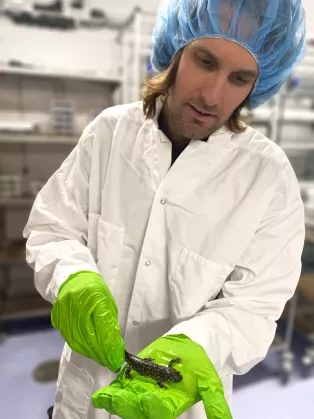It was the ability of moose to grow new antlers after shedding that first sparked Nicholas Leigh’s interest in regenerative research. For practical reasons, the choice fell on smaller animals, in his case salamanders.
"We humans can also regenerate tissue, for example when a bone fracture is healed. During pregnancy, foetuses can heal skin without scarring, and young children can actually recreate a fingertip, including fingerprints and nail, in the event of an injury. However, we lose these regenerative abilities as we get older."
Searching for an 'off switch' for cancer
Nicholas Leigh is a senior lecturer and researcher in regenerative immunology. In Sweden, only a few research groups in the field study salamanders. One challenge is that it takes one year before they reach reproductive age, which prolongs the research process because it takes longer time than mouse models to study. Until recently, the genome of salamanders, which is up to ten times that of humans, had not been mapped.
Despite salamanders’ long lifespan and enormous genome, which could mean a higher risk of mutations, they very rarely develop cancer. This makes them interesting from a research perspective:
If you block the genes that inhibit tumour development in human cells, the cells begin to divide uncontrollably, and tumours arise. However, in salamanders, it appears that they have fewer of these tumour-inhibiting genes. Even so, there are genes that promote healing and allow the regeneration of tissue.
By studying the cells that control the regeneration of salamanders and how genes are turned on and off, Nicholas Leigh can compare with what happens in human cells when tumour cells develop.
"In this way, we hope to be able to find a kind of ‘shutdown button’ for cancer."
Making academic research a more diverse and inclusive space
Nicholas Leigh is also very involved in work environment issues and, together with Associate Professor Sofie Mohlin, leads the Diversity, Equity and Inclusion (DEI) Committee at Lund Stem Cell Center. According to him, PhD students and postdocs are particularly vulnerable to mental health issues because of academic pressure and uncertainty about the future. It is also easy to feel isolated for those who move to Sweden without knowing the language.
- In Lund, there is a lack of associations and networks, as well as an organized welcome for postdocs, something that, on the other hand, is common in the USA where I come from.
The current funding landscape, with reduced government funding and increased rental costs, together with overheads on external grants, is leading many research groups into financial strain. The pressure means that many PhD students and postdocs have an uneven workload, taking on a lot of responsibility for research while also participating in activities such as seminar series, graduate schools and leadership programs.
- I personally think this has a big impact on how they feel during their time at university. We need to think about how we train our PhD students and postdocs and how we can better help them focus on becoming excellent researchers and not just experts at multitasking.
Many doctoral students and postdocs have their feet in several different groups, and the university's complicated organization contributes to creating problems with belonging. It's hard to know where to turn when you need help.
For the DEI committee at Lund Stem Cell Center, one of the goals is to build community through various activities. In this way, they want to break loneliness and promote a sense of belonging. Another important task is to raise awareness of the problems that stem from inequality.
- We need more people to engage with issues of diversity, equality and inclusion. One of the problems is that those who are most vulnerable and affected are the ones who engage the most and try to change the conditions for everyone. However, those who are already privileged also need to get involved in these issues and not stand idly by. Ultimately, diversity fosters both innovation and creativity.




